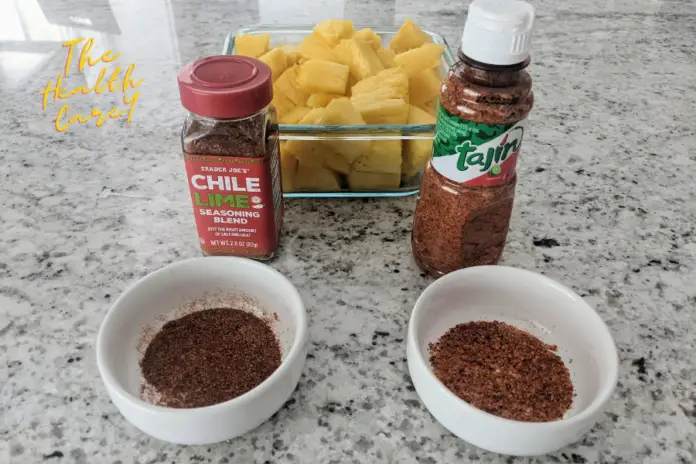Is Tajin Bad for You? Are you a fan of Tajin seasoning but worried about its impact on your health? Tajin is a popular Mexican seasoning that uniquely flavors many dishes. It is made from chili peppers, lime juice, and salt, among other spices. However, some people have raised concerns about the health effects of consuming Tajin regularly.
While Tajin is a healthy seasoning, it is important to consume it in moderation. One-quarter teaspoon of traditional Tajin contains zero calories, fat, carbs, protein, no added sugar, and 190 milligrams of sodium, equivalent to 8 percent of the daily allotment. Tajin’s ingredients, including dried and ground red chilis, dehydrated lime juice, and sea salt, are generally healthy. However, excessive consumption of Tajin can lead to negative health effects.
This article will explore the potential health benefits and risks of consuming Tajin seasoning. We will examine the ingredients and nutritional value of Tajin and the effects of consuming it in excess. By the end of this article, you will better understand whether Tajin is bad for you and how to consume it responsibly.
What is Tajin?
Tajin is a Mexican seasoning that has become increasingly popular in recent years. It blends dried and ground red chilies, sea salt, and dehydrated lime juice. The combination of flavors creates a zesty, tangy taste that can add a kick to any dish.One of the reasons Tajin has become so popular is because it is a healthy seasoning option. The ingredients in Tajin are all-natural and contain no added sugars or preservatives. The seasoning is also low in calories and fat, making it a great addition to any diet.
Tajin is also versatile and can be used in a variety of ways. It is commonly used as a topping for fruits and vegetables, such as mango, watermelon, and cucumbers. It can also be added to marinades, dressings, and sauces to give them an extra kick of flavor.
Ingredients in Tajin
Tajin is a popular Mexican seasoning known for its tangy, spicy, and salty flavor. It is a blend of various ingredients that create its unique taste. Here are the ingredients in Tajin:
| Ingredient | Function |
|---|---|
| Dried and ground red chilis | Provide heat and spiciness |
| Dehydrated lime juice | Imparts tanginess and acidity |
| Sea salt | Enhances flavor and provides saltiness |
| Anti-caking agent | Prevents clumping of the ingredients |
One-quarter teaspoon of traditional Tajin contains zero calories, fat, carbs, protein, and no added sugar. However, it contains 190 milligrams of sodium, about 8% of the recommended intake. Tajin can be used for various savory and sweet preparations, including fruits, vegetables, meats, and even cocktails.
Overall, the ingredients in Tajin are very healthy for you. The blend of spices and seasonings can add flavor to your dishes without adding extra calories or unhealthy ingredients. However, it is important to use Tajin in moderation as consuming too much of it can lead to health problems such as high blood pressure due to its sodium content.
Nutritional Value of Tajin
Tajin is a popular Mexican seasoning that has gained popularity throughout the world. It is a unique blend of chili powder, lime, and salt, often used to flavor fruits, vegetables, and meats. Many people wonder whether Tajin is bad for their health, but the truth is that it is a healthy seasoning that can be incorporated into a balanced diet. Here is a breakdown of the nutritional value of Tajin:
| Nutrient | Amount per 1/4 tsp |
|---|---|
| Calories | 0 |
| Total Fat | 0g |
| Saturated Fat | 0g |
| Trans Fat | 0g |
| Cholesterol | 0mg |
| Sodium | 190mg (8% of daily value) |
| Total Carbohydrates | 0g |
| Dietary Fiber | 0g |
| Sugars | 0g |
| Protein | 0g |
As you can see, Tajin contains no calories, fat, carbs, or protein. However, it contains 190 milligrams of sodium per 1/4 teaspoon, which is 8% of the recommended intake. While this may seem like a lot, it is important to remember that Tajin is a seasoning meant to be used in small amounts to add flavor to food.
Tajin contains no added sugar, making it a healthier alternative to other sweet seasonings. It is also gluten-free and vegan, making it suitable for people with dietary restrictions.
In conclusion, Tajin is a healthy seasoning that can be incorporated into a balanced diet. While it does contain sodium, it is meant to be used in small amounts and can help add flavor to fruits, vegetables, and meats without adding extra calories or sugar.
Is Tajin Bad for You?
Due to its unique flavor profile, Tajin is a Mexican seasoning that has become increasingly popular in recent years. It is made with a blend of chili peppers, dehydrated lime juice, and sea salt and is commonly used to add a tangy, spicy kick to various dishes.
But is Tajin bad for you? The answer is no, not exactly. Tajin itself is a healthy seasoning, but things can go wrong when too much of it is consumed. Tajin’s ingredients are generally healthy for you, from dried and ground red chilis to dehydrated lime juice, sea salt, and sometimes anti-caking agents.
However, it is important to note that Tajin is high in sodium, with just one-quarter teaspoon containing 190 milligrams of sodium, which shakes out to 8 percent of the daily allotment. This can be a concern for people watching their sodium intake, especially those with high blood pressure or other cardiovascular issues.
Additionally, consuming too much Tajin can cause stomach upset, heartburn, and other digestive issues. It is important to use Tajin in moderation and to be mindful of how much you are consuming.
Overall, Tajin is a tasty and healthy seasoning option that can add a unique flavor profile to your dishes. However, as with any seasoning, it is important to use it in moderation and to be mindful of how much you are consuming.
is tajin fruit seasoning bad for you?
Tajin Fruit Seasoning is generally considered safe to consume but may be high in sodium. If you are concerned about your sodium intake, then it is best to use the seasoning in moderation or look for a lower-sodium version.
Tajin Fruit Seasoning blends chili peppers, sea salt, and dehydrated lime juice. It also contains trace amounts of other spices, such as garlic and oregano. The combination of these ingredients gives Tajin its signature flavor profile.
The sodium content in Tajin Fruit Seasoning can vary depending on the brand, but it is generally high compared to other seasonings. One teaspoon (2.8 grams) of Tajin Fruit Seasoning typically contains 110 milligrams of sodium, approximately 5% of the recommended daily intake (RDI).
In addition to being high in sodium, Tajin Fruit Seasoning may contain added sugar or artificial sweeteners if it’s not labeled as “unsweetened” or “no-sugar-added.” Therefore, you should always check the nutrition label before consuming any seasoning product.
Overall, Tajin Fruit Seasoning can be consumed safely in moderation for a flavorful kick to your meals without excessive unhealthy ingredients like added sugar or saturated fat.
Potential Health Benefits of Tajin
Tajin is a popular Mexican seasoning that has been used for centuries. While it is primarily known for its delicious flavor, it also offers several potential health benefits. Here are a few:
- May help reduce inflammation: According to a report from the American Heart Association Scientific Sessions, consumption of chili pepper, one of the primary ingredients in Tajin, may reduce inflammation in the body.
- May improve digestion: Tajin contains lime juice rich in citric acid. Citric acid can help stimulate the production of digestive juices and enzymes, aiding digestion.
- May boost the immune system: Tajin contains vitamin C, essential for a healthy immune system. One teaspoon of Tajin contains about 10% of the daily recommended value of vitamin C.
It’s important to note that while Tajin may offer some potential health benefits, it is not a cure-all. It should be consumed in moderation as part of a balanced diet. Additionally, those with certain health conditions, such as acid reflux or irritable bowel syndrome, may want to avoid or limit their intake of Tajin due to its spice content.
How to Use Tajin
Tajin is a versatile seasoning that can be used in various ways to add flavor to your favorite foods. Here are some ideas:
- Sprinkle Tajin on fruits like mango, pineapple, and watermelon for a sweet and tangy snack.
- Use Tajin to season grilled meats like chicken, steak, or shrimp for a spicy kick.
- Add Tajin to roasted vegetables like broccoli or cauliflower for a zesty twist.
- Mix Tajin with sour cream or yogurt to make a flavorful dip for chips or veggies.
- Stir Tajin into guacamole for a spicy twist on this classic dip.
Remember, a little goes a long way with Tajin. Start with a small amount and add more to taste. And be sure to store it in a cool, dry place to keep it fresh.
Overall, Tajin is a healthy seasoning that can add flavor to your meals without adding extra calories or unhealthy ingredients. So experiment with different ways to use Tajin in your cooking!
Conclusion
After reviewing the available information, it is safe to say that Tajin seasoning is not bad for you when consumed in moderation. It can provide some health benefits such as anti-inflammatory effects and being keto-friendly due to its low carb and calorie content.
While there are concerns about lead contamination in some Mexican-made products, including Tajin, there is no evidence to suggest that Tajin contains harmful levels of lead or other toxins. Tajin’s ingredients are generally healthy, consisting of chili peppers, sea salt, and dehydrated lime juice.
It is important to note that excessive consumption of Tajin or any seasoning can have negative effects on your health. Too much sodium can lead to high blood pressure and other health issues, so using Tajin and other seasonings in moderation is important.
If you enjoy the zesty flavor of Tajin, there is no reason to avoid it. Just be mindful of your intake and use it as a flavorful addition to your meals rather than relying on it as a primary seasoning.
Also Read:
How To Get Fiberglass Out Of Skin
What Does a Respiratory Therapist Do
How Effective Is The Total Body Enhancement Fitness Therapy For Your Body?






















